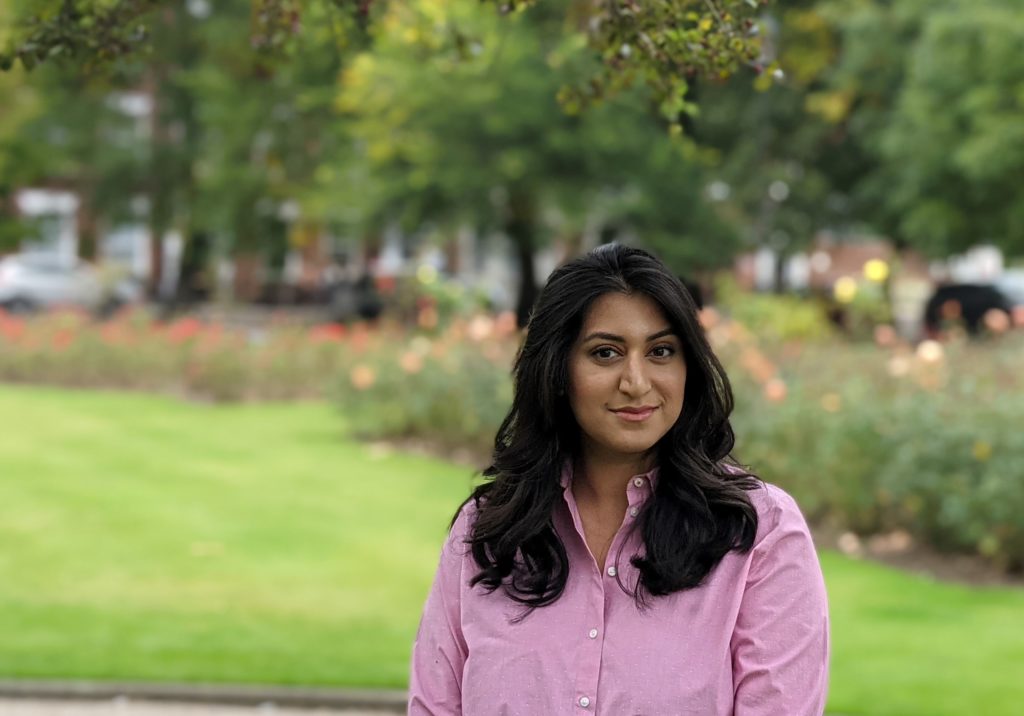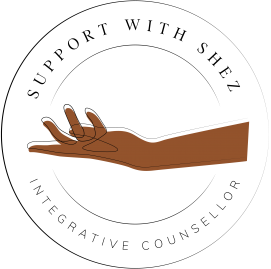MEET SHEZ
Qualified counsellor & psychotherapist with experience of working with adults, children and adolescents.
- Insured
- Registered BACP member
- Non-clinical therapy style
- Approachable and friendly
- Theory based counselling
Below, find out more about Shezray’s training, professional experience and life outside of being a therapist.

So far, I have practised in local counselling services, therapy centres, employee assistance programme (EAP) counselling helpline, a women’s well-being centre, primary/high schools and sixth form colleges.
Currently, I am a Student Counsellor for a cluster of primary and high school students in Leeds and meet with private clients for evening and weekend appointments. Private sessions are held over online video call or in-person at my therapy room in Leeds, West Yorkshire.
I have experience of supporting clients with a range of mental health difficulties. Some examples are:
- low self-esteem, self-worth and self-confidence
- attachment difficulties (childhood)
- understanding attachment
- childhood trauma
- family or romantic relationship difficulties
- anxiety
- OCD
- low mood
- depression
- low motivation and drive
- stress
- self-harm
- poor body image
- eating difficulties
- low – medium level trauma
- grief and bereavement
- culture-specific issues
- attachment style and the impact of this in romantic or non-romantic relationships
Why did you choose to be a therapist?
During my A Levels, I was interested in Psychology because of TV shows and books I had read on personality and mental health. Because of my interest, I voluntarily joined A Level psychology lessons to learn more about the subject and career options. I was then lucky to have found insightful work experience with a psychotherapist who was very passionate and talented – observing her live therapy sessions was fascinating! I loved seeing how empowered clients felt when they left the therapy room. From then on, I was motivated to train as a therapist.
Personal life experiences furthered my motivation and desire to qualify as a therapist. During my undergraduate studies, I struggled with psychosomatic anxiety. To learn how to cope and manage this, I started personal therapy. My therapist made me feel safe and comfortable. She normalised my struggle with anxiety by teaching me that anxiety is natural and essential for survival. There was nothing to be ashamed of. Through counselling sessions, I understood my triggers and developed a coping toolkit of helpful strategies. Over time, I started to regain control over my mind and also learnt how to relax my body.
My experience of personal therapy highlighted that mental health is real and that our minds and body are closely connected. What we think and feel directly impacts our overall health and well-being. Personal therapy also highlighted how important professional understanding and support is when trying to heal and improve our mental health.
Why did you name your practice Support with Shez?
Often, counselling services have a clinical or well-being themed name but I wanted to have a personal/unique style. Because I am an independent practitioner, it made sense to have Shez or Shezray in the name. The use of ‘with’ was also planned as I do not view myself as the expert or leader in counselling sessions. Instead, I work collaboratively with my clients, hence, Support with Shez. I also felt that the word ‘support’ is a kind and soft word and loved the alliteration it has with Shez!
What have you learnt through being a therapist?
During my training, I became more aware of the stigma and stereotypes which exist around mental health – especially within the South Asian community. Since realising this, my aim is to increase education and awareness around mental health issues (and the impact of them on everyday life) within the South Asian community. I am hopeful that this can be achieved through psycho-education via social media along with open and honest conversations about mental health with South Asian children, teens, adults and seniors.
Furthermore, I have learnt the importance of factoring in culture and environment when working with clients. We are trained to understand a client’s background, however, my experience has taught me that culture, religion and social environments play a huge part in client difficulties as well as healing.
Who are you outside of being a therapist?
Outside of work, I like to spend time with my close friends and family but also value ‘me time’. Taking myself out to a fancy coffee shop is now a hobby! I have always loved reading so I enjoy doing this in my spare time as it allows me to escape reality and instead dive into a world created by the author. I’m a huge Grey’s Anatomy fan so tend to be watching (or re-watching!) this in my spare time also. During extended periods of time off, I love to travel and have been lucky enough to tick off many places so far – with many more still on the list! Generally, I love to eat out, try new cuisine, shop and bake. Travelling and trying new cuisine is enjoyable and a great way to learn about different cultures, lifestyles and people. Having a deeper understanding of what makes people different/similar and how different cultures/societies operate is useful when working with clients in counselling.
What is your background?
I was born and raised in England but maintain a close connection with my Pakistani roots through visiting my extended family in Pakistan often. Therefore, I am fluent in English, Urdu and Punjabi.
Belonging and identifying with two largely different backgrounds has shaped my beliefs, interests and experiences. I am grateful to have had the best of both worlds but also know how tricky it can be to find a balance between two cultures, identities and lifestyles. Perhaps, this is why I am confident in working with, and relating to, clients with either of the two backgrounds, identities and experiences.

